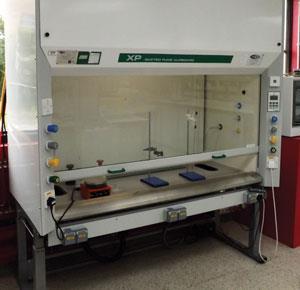How do aspiring chemists with disabilities fare at university, and where can they get support? Helen Carmichael talks to staff and students at one university to find out
According to Robin Perutz, professor of chemistry at the University of York, ‘one of the biggest issues for students with disabilities is that they are not aware of the support they can access’. Students often ‘think wrongly that they will be discriminated against in their applications, so they don’t declare [their disabilities] on the application form,’ he adds. ‘They think it will impact their chances – it won’t.’ But can you do a chemistry degree with any disability? ‘For almost all problems you might encounter, the answer is yes,’ assures Perutz.
Perutz is a member of the UK’s Stem (science, technology, engineering and maths) disability committee. With representatives from the Royal Society, Royal Society of Chemistry, Institute of Physics, Society of Biology, and Royal Academy of Engineering, the committee provides support for actual and aspiring students with disabilities, their teachers, and disabled workers in Stem.

About 8% of the UK’s science graduates are students with disabilities. And crunching the numbers, there’s no evidence that disabilities are a factor in whether students choose science subjects, either at university or at secondary school – students with disabilities account for about the same proportion of science and non-science subject populations. York’s department of chemistry is in line with these figures, although the number of disabled students varies considerably from one year to the next.
Committed to change
Historically, a single member of staff might be seconded for a few days per week to oversee disability issues for the whole university, but the last two decades have seen major changes and that situation is unthinkable today. ‘If you’re talking about 8% of the student population, then a university the size of York will have about 1000 students with disabilities,’ Perutz points out. But it’s hard to know whether more disabled students study science at university today than in the past, since the awareness of ‘hidden’ disabilities like dyslexia, dyspraxia and Asperger’s is now much greater than it once was. The number of students declaring mental health problems has also increased nationally.
Dyslexia is the single biggest issue among students, says Perutz and ‘much more widely raised and recognised than it used to be’. Lecturers can reasonably assume that every class they teach will include at least one student affected by dyslexia. ‘Due to my dyslexia, most tasks are affected as it takes me longer to read and write the work I need to do,’ one chemistry student explained. He says he has the appropriate support, but that tasks do eat into his free time.
Details matter
Physical accessibility is good for chemists at the University of York, where most of the buildings are single-storey, and the new teaching labs under construction will continue to feature adjustable fume cupboards. But physical access issues can be complex. ‘My mobility is affected by my condition, I find it hard sometimes to get into university,’ says Alice Wells. ‘I have a problem with fatigue as well, so in labs I get very tired quickly – I was very worried that I would fall behind due to missing lectures and having problems in the teaching labs.’ Notifying staff of these issues, as well as having a note taker in some lectures, has helped says Wells, and she also participates in a student disability support group.
Supporting a student’s ‘can do’ mentality is essential, says Perutz, and for many with disabilities, it’s simple things that make the most difference. Perutz mentions students with serious pain problems, where a better stool or additional work breaks can offer relief. ‘When I use a confocal microscope, the sessions can be long and require lots of sitting and close work,’ says Katrina Bakker, a final year PhD student in materials science. ‘I explained to the technician that I needed regular breaks and she was very accommodating.’

Technical support can take the form of specialist software or hardware, or maybe a digital recorder or video recorder for lectures in place of note taking. But low-tech solutions can be useful too: a simple hand-held magnifier might suffice for a visually impaired student’s laboratory work and lecture notes in electronic format allow a student more time to access material in their preferred manner. ‘I am given handouts – on green paper as it’s easier to read – a few days before the start of the lecture course to give me time to read them properly,’ says Tegan Rawlinson, a second year BSc student with dyslexia.
Testing times
A reader, a writing assistant, oral assessment or extra time are all ways that departments can make exams accessible. Perutz cites the example of a visually-impaired student with a form of tunnel vision: it took a long time for both the student and the department to realise how much a reader would improve exam situations. ‘It helped enormously, but we should have realised that earlier – these are things you work out by discussion over a number of sessions,’ Perutz says. The same student declined a lab partner, explaining that he placed items he needed for experiments in specific locations, and ‘helpers’ had a tendency to move things around. ‘Students come in with varied experience, and often little experience in the lab,’ says Perutz. ‘They can’t always tell you what their needs are going to be and you have to work this out as you go.’
There is no one-size-fits-all solution. Departments, disability services and students need to work together to tailor support to each individual. ‘There is amazing help there,’ says Rawlinson, ‘but it does not just appear: you have to ask for the help for it to be given to you.’
Josh Reid says that he found written work and presentations very challenging: ‘I became more stressed and worried about the resulting work, which in turn affected my marks.’ An MChem graduate, Reid says that for him ‘perhaps the most useful arrangement made by the chemistry department was the assignment of an in-department study skills mentor.’ The mentor worked with him to boost certain skills, such as presenting to an audience, extended writing and lab reports, and organising his work timetable around extra-curricular activities. ‘This has been very effective, as I feel I am more confident in presenting, that my written work is more coherent and clear and that I can better organise my work around social events. I would not have been able to make these developments on my own, and as a result I feel more prepared to face life as a graduate student.’ Reid says that he can’t wait to begin his PhD in September with the University of York’s Seishi Shimizu, based at TWI in Cambridge.
Financial support
In the UK, university disability services typically assess students to find out if they qualify for a disabled students allowance (DSA). But there can be a mismatch between the funding and the actual needs: ‘The needs assessment process is not usually conducted by assessors with a working knowledge of the programme of study content and demands, and this is especially true in Stem subjects, which often have specific requirements for technical and laboratory work,’ according to the Stem disability committee. Costs are often underestimated and can exceed the DSA as additional requirements become clearer. Perutz concurs that the generic reports often produced by assessors don’t address issues relevant to science students: ‘How will the problems affect the student in the lab? If they are dyspraxic, do they have bad handwriting, or are they going to find it acutely difficult to weigh out compounds and manipulate instruments?’ Failure to appreciate that chemistry is a mathematical subject is another common frustration, Perutz adds.
Students’ experience varies: Rawlinson found disability officers ‘very proactive,’ an impression that has been sustained mainly due to ‘chemistry’s disability officer checking that I have all the support I need. I also get help from central disability services with filling out forms.’ However, Bakker found applying for DSA a challenge, as the external assessor ‘knew nothing about how science students study (for example lab work). As a result, I think I didn’t achieve the best outcome.’
The Stem disability committee is starting a new project, in conjunction with the National Network of Assessment Centres to provide assessors, Stem academic staff and Stem students with resources, skills and knowledge to solve assessment issues.
For students with disabilities, then, it’s definitely a two way street, where suggestions, problem solving and dialogue with academic and disability staff are essential to get the most out of the degree experience. ‘Accessibility could be improved by making the help more well known a lot earlier on in the process of applying to university or even considering it,’ says Rawlinson.
‘I don’t think there is enough being done to promote the good work the department does to support students who have difficulties like my own, and more,’ adds Reid.












No comments yet